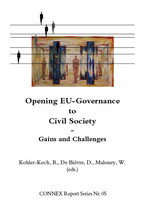Beate Kohler-Koch, Dirk De Bièvre and William Maloney (Eds.) |
|||
| Opening EU-Governance to Civil Society | |||
| Gains and Challenges |
 |
||
| CONNEX Report Series No 5 | |||
| 381 p., Mannheim, 2008 | |||
| ISSN1864-1539 | |||
|
Go to |
Abstract
Efficient and democratic governance is not just a matter of the institutional architecture of the European Union. Rather, EU-society relations and structures of civic engagement have to be assessed. Is social capital a catalyst of civic engagement that extends from the local to the European level and how are stocks of social capital distributed across the EU nations? Is the EU plagued by biased representation and if so does it really matter? Is civil society a remedy to the perceived legitimacy crisis of the EU? How do we make sense of the divergent concepts of civil society and what role should civil society play in EU governance? Several contributions address the promises and shortcomings of participatory engineering and analyse the democratic potential of participatory governance both within the EU and as an export product to third countries.
Contents
Introductions
I. Assessing Interest Politics in EU Governance
D. De Bièvre
II. Civil Society Contribution to Democratic Governance: A Critical Assessment
B.
Kohler-Koch
III. Social Capital as Catalyst of Civic Engagement and Quality of Governance
W. Maloney
Biased Representation and Interest Group Influence
Chapter 1
The Question of Interest Group Influence
A. Dür / D. De
Bièvre
Chapter 2
How Much Influence Do Interest Groups Have in the EU? Some
Methodological Considerations
A. Dür
Chapter 3
The Professionalization of Representation: Biasing Participation
W. Maloney
Myth and Reality of Civil Society
Chapter 4
Civil Society as Discourse: Contending Civil Society Frameworks
B. Jobert
Chapter 5
EU- Civil Society Relations: The Impact of the EU on National
Movements and National Identity
L. Cram
Participatory Engineering: Theoretical Assessment and Empirical Findings
Chapter 6
Participatory Engineering: Promises and Pitfalls
T. Zittel
Chapter 7
Assessing the Democratic Value of Civil Society Engagement in the
European Union
T. Hüller / B. Kohler-Koch
Chapter 8
The EU Commission Consultation Regime
C. Quittkat / B.
Finke
Chapter 9
The Promises and Pitfalls of Participation: What Voice for the
Regional Advisory Councils?
J. O’Mahony
Chapter 10
Is Local Civil Society Conducive to European Participatory
Engineering?
W. Maloney / J. W. van Deth
Exporting Democracy and Civil Society
Chapter 11
EU External Democracy Promotion: Approaching Governments and Civil
Societies
M. Knodt / A. Jünemann
Chapter 12
The European Union as an External Democratizer: EU Contributions to
Civil Society Development in Central and Eastern Europe
S. Stewart
Social Capital as Catalyst of Civic Engagement
Chapter 13
Civil Society Organisations in a Knowledge based Society
F.
Adam
Chapter 14
European Civil Society: The Empirical Reality in the Multi- Level
System of the EU
J. van Deth
Conference Report
C. Quittkat
Annex
Publications RG4 & RG5